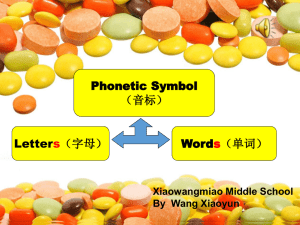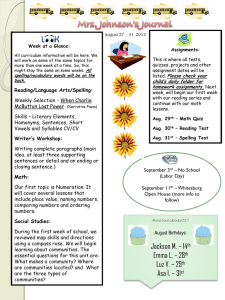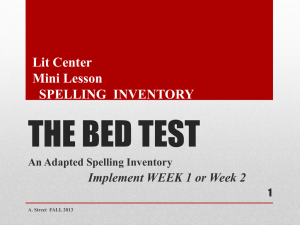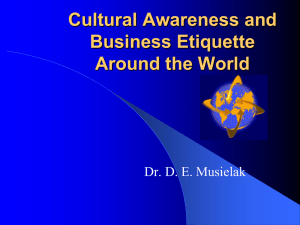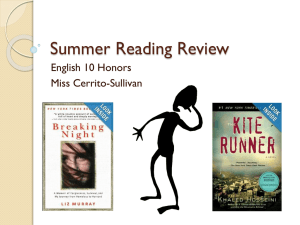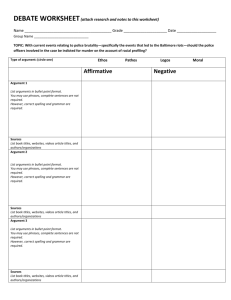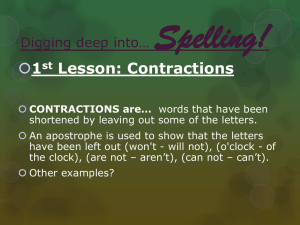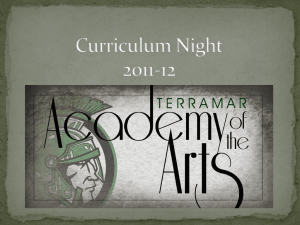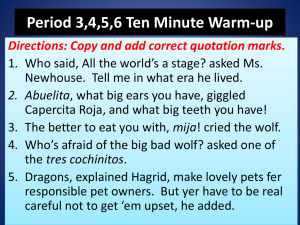Unit 2 Reading/Who Works Here - Day 3
advertisement
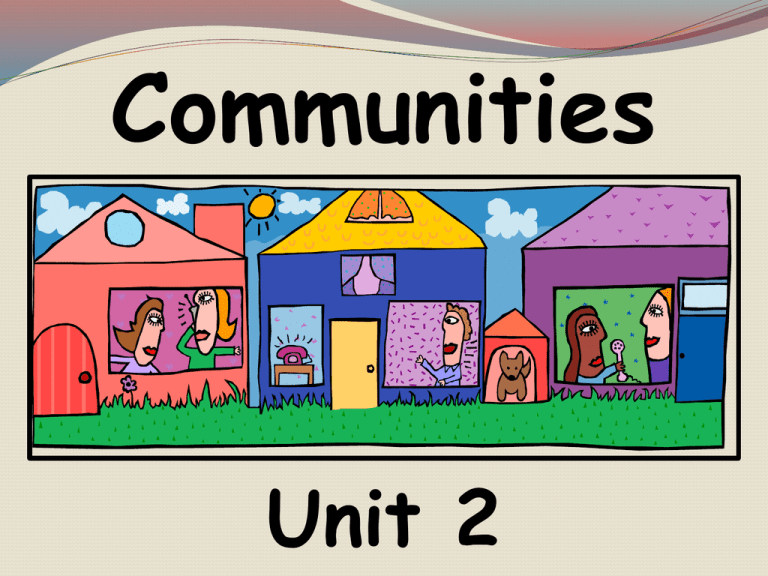
Communities Unit 2 Who Works Here? By: Melissa Blackwell Burke Who works where you live? Objectives Yesterday: Long i (CVCe), Digraphs wh, ch, & tch, High-frequency words & Special Titles Today: Spelling and Phonics: Long i (CVCe) and digraphs wh, ch, & tch Skill: Author’s Purpose & Story Grammar: Special Titles Morning Warm-Up! Today we will read about workers in a community. If you watch them, you will see that they do much to help us. Question of the Day What workers do you have in your community? citizen community law leader Amazing Words headquarters patrol branch Objective: Build oral vocabulary. Just what do they mean? citizen – a person who lives in a certain location community – the town or city in which you live law – a rule that tells people what they can and cannot do leader – the head of a group Just what do they mean? headquarters – places where business or city leaders work patrol – to move around, watching or guarding branch – a smaller type of a larger bank, library, or office Time to Read Share Literature-Build Concepts Walk Around a City gives information about a real place. The words that appear in boldface type are the ones the author thought the reader should know to learn about a city. These words appear in the Glossary at the back. Walk Around a City By: Peter and Connie Roop Time to Read Share Literature-Build Concepts Walk Around a City • Yesterday the class read the book to find out why a city needs police and firefighters. • Listen today to find out what other kinds of jobs people do in a city. Build Oral Vocabulary What are some jobs people do in a city? Is there just one library, one bank, or one grocery store in a city? Why do these things need to have branches? Phonemic Awareness We just read how people travel on subways in cities. On a subway, you can read while you ride. Listen to the sounds in while. /hw/ /i/ /l/ Now say each sound as you write the letter that goes with it. /hw/ /i/ /l/ = while whine chime white chive Objective: Blend and segment phonemes. Blending Strategy We have had words like made and lake. Long i (CVCe) bike = b i k e wide ripe time prize life dime mine kite like wise rice mice shine Long i (CVCe) Word Review like time fine kite mice nice nine smile pile pine bite shine dine wipe ice lime Blending Strategy We have had words like ship and them. Digraphs wh, ch, tch when = wh e n chip = ch i p catch munch champ which match such chop whale itch much chick lunch Words To Know which such while white when whale chin chat chess check patch ranch Mitch lunch much catch watch match hatch batch fetch chick A Nice, Fine Neighborhood Neighbors like to work together. They watch out for everyone. They pitch in to help each other Until all the chores are done. Neighbors like to play together. They put out the welcome mat. Children ride bikes on the sidewalk. Grown-ups sit outside and chat. When the busy day is over, Happy neighbors feel so good. They all smile at each other. What a nice, fine neighborhood! Sort Words Long i wh ch tch size when chalk switch hike whisk chick whale fetch catch slide Sentences To Read 1. I rode my yellow bike while my kite was flying behind me. 2. The sidewalk outside the school is where I like to play. 3. I cannot drive the glider. 4. The lime is ripe enough to eat. 5. You are wise not to play with fire. 6. Nine mice ate five bites of cheese. 7. Mike has nine dimes with him. 8. Life is so much fun to live. 9. I want a big size pizza slice. Spelling Words like bike ride hide smile ice dime time kite white Objective: Segment sounds to spell words. Spelling Practice Unscramble your spelling words. keli emit like time bkie cei bike ice drie tiewh ride white emdi tkie dime kite silem smile deih hide What are some sounds you might hear in our community? school bells police siren children playing construction equipment Community Sounds people talking car horns train whistles dogs barking Why might different kinds of communities have different kinds of sounds? Build Background Connect to the Selection The people who work in a community help us in many ways. We’ll read a selection that tells about some workers and how they help a community. Vocabulary Selection Words mail – letters or packages sent through a post office and delivered to homes or businesses neighborhood – a place where people live and work together busy – having many things to do Vocabulary High Frequency Words Pages 66-67 people live work who out High-Frequency Words out live work who people your they to way where Comprehension Skill: Author’s Purpose People write things for different reasons. Sometimes authors write to explain something or give information. Other times authors write to be funny or to entertain. As you read, look for clues about why the author wrote the selection. Strategy: Ask Questions Good readers often ask themselves questions that help them understand and remember what they are reading. Comprehension Ask yourself these questions as you read Who Works Here? What do I want to know? When I look at the pictures, what do I wonder about? Does the author want me to learn something? What? Who Works Here? Pages 68-77 Time To Read Time for Stations Vocabulary Directional Words The police officer wants children to look all ways before crossing the street. Tell which ways you should look before crossing the street. Look to the right. Then look to the left before you cross the street. Writing Trait of the Week Introduce: Conventions Conventions are rules good writers follow when they write. Good writers spell words a certain way. They begin sentences and special titles with capital letters. They put end marks after sentences and some special titles. Think about whether the author of Who Works Here? Follows spelling and sentence rules. Who drives a big bus? That is Mr. Chang. Suppose the author had written these sentences. Are they written correctly? Writing Trait of the Week Introduce: Conventions Look at the following paragraph. Add capital letters and end punctuation where needed. our bus driver is ms franklin she takes us to school and back home now she is moving away we need a new bus driver will you take the job Our bus driver is Ms. Franklin. She takes us to school and back home. Now she is moving away. We need a new bus driver. Will you take the job? Grammar – Special Titles We call some persons by special titles. A police officer might be called Officer. If you know a police officer’s name, you might call him Officer Brown. Special titles can make your writing more interesting. person special title a doctor Dr. Reed man Mr. Davis Wrap Up Your Day! Sometimes you need to pause and think about what you read to be sure it makes sense. A good reader often asks questions to help make the information easier to understand. How does each helper help me? How does the helper help our community? Why did the author write this selection? Who makes our neighborhood a nice place in which to live? How Community Workers Help Us How We Help Them keep us safe put out fires take care of parks govern the community help solve problems keep the community clean obey the laws practice fire safety in our homes/businesses protect the environment participate in community events help leaders solve problems Preview Day Four Tomorrow we will read about the places in a community. Extra Daily Fix-It 1. The Mail truck went past 2. NO mail is in the bx. Waltke’s Web Powerpoint http://classroom.jc-schools.net/waltkek/First1.html Mrs. Waltke is a veteran teacher living in Jasper and working in the Jasper School System. Carl’s Corner http://www.carlscorner.us.com/ Cherry Carl is a retired teacher who lives in California. She teaches at UCLA. Time to Listen to the Story Who Works Here? Pages 68-77 Extra pictures Grammar
